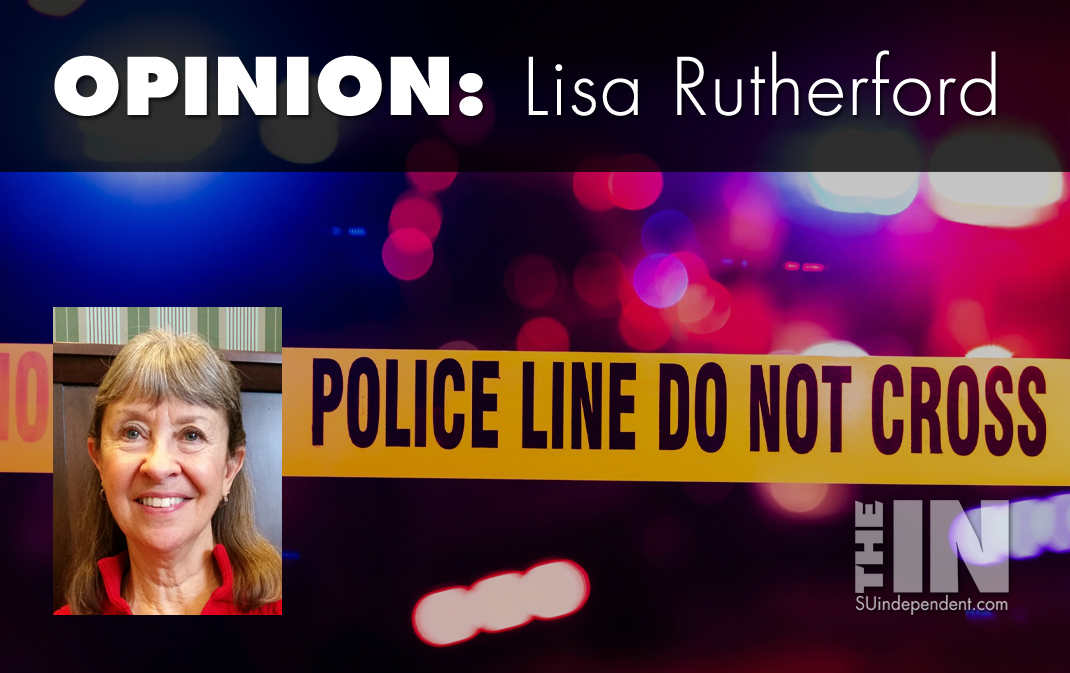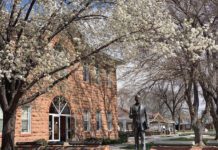
Loving Christmas and Each Other
– By Lisa Rutherford –
For many, Christmas can be a very challenging and difficult time. But I’ve always loved it. I’ve loved the lights, the colors, the smells, the music, the energy—but most of all, the love.
For me, Christmas isn’t really about the presents, although those are nice, too. It’s the whole atmosphere that is created when we decorated the house and the fact that I try to keep in mind that Christmas, at least the Christmas I was raised with, is about Jesus, a human who, by all accounts, embodied what we should all aspire to. I’m not the most patient person, as many who know me will attest, but during Christmas, I try to be a better person in that regard and feed my better angel. It’s a time when we should all look at ourselves and consider what we can do better.
I feel for those for whom Christmas can be a troubling season. I guess with all the emphasis on buy, buy, buy, it’s difficult to focus on what’s really important. Unfortunately, many who cannot afford to are racking up credit card debt and will be faced with that reality after the holidays, perhaps much to their despair.
But even with my love for the season I, too, am sometimes distraught. The hate and the escalation of hate we are witnessing in this nation, a nation of so much wealth and freedom, stirs my angst. With so much freedom why is there so much hate? Why is the hate escalating so much? What is it about the lives of those who hate and want to do harm that drives them?
The proliferation of guns in our nation is part of the problem, but behind every gun is a person with some serious hate issues – hate either for themselves that drives them to hate others or hate for others whom they feel are not worthy to continue living.
White men, particularly young white men, are the most likely to feel that hatred and be pushed to commit hate crimes and be part of hate groups. But there are plenty of white men, young and old, who do not fall victim to the psychological attributions that cause this to happen.
The most current FBI data for hate crime incidents, 2021, reveals that these incidents actually dropped from a two-decade high in 2020. The agency acknowledged, however, “that the figures exclude totals from more than one-third of the country’s law enforcement agencies.” Even given that exclusion, 2021 saw more than 7,200 hate crimes reported, more than half were based on race, ancestry or ethnicity. The remaining included hate crimes based on sexual orientation or religion bias. A hate crime is defined by the FBI as “a traditional offense like murder, arson, or vandalism with an added element of bias.”
One reason for the lack of complete reporting has been the implementation of a new data reporting system in 2021. The missing information includes the two biggest U.S. cities: New York and Los Angeles. So, it is pretty obvious that the 2021 data does not capture the full extent of hate crimes in this country.
But groups that track police data found that hate crimes rose in 2021, and that extends a recent trend. The Center for the Study of Hate and Extremism at California State University’s survey of data from 18 states and Washington, D.C., revealed an increase of 21% in hate crimes from 2020 to 2021.
Back in October, 2017, former President George W. Bush delivered a speech in which he lamented, “We’ve seen nationalism distorted into nativism. Bigotry seems emboldened.” And, that was before the many attacks and deaths we’ve witnessed over the past five years. The Anti-Defamation League and the Southern Poverty Law Center along with cities and other municipalities reported that 2017 saw a 22 percent increase in hate crimes from 2016. Former President Bush had good reason to lament our nation’s situation.
The U.S. has witnessed other times filled with hate and FBI hate crime charts from 2000 to 2016 actually show hate crimes coming down prior to a resurgence starting in 2014. In fact, the peak during that sixteen-year period was 2001 that saw over 9,000 hate crimes. The upward trend starting in 2014 and which has now reached 7,200 in 2021, which is acknowledged to be a low number due to reporting, is very troubling.
But, as I noted, these cycles of hate are not new in America where economic and social insecurity can fuel bigotry. New forms of communication such as the internet have helped to spread it. Even respected founding fathers such as Benjamin Franklin were not without biases against foreigners who were not “purely white People” and argued, “I am partial to the Complexion of my Country, for such Kind of Partiality is natural to Mankind.” In fact, all the eras of hate have had political and cultural leadership that condoned hateful views and their expression. President Woodrow Wilson worked to resegregate federal government employees after World War I, and during the civil right era Lester Maddox, Strom Thurmond and George Wallace were outspoken opponents of those seeking their rights. Recent leaders I will not name have led us into the situation we now are experiencing.
The belief that “our problems are caused by someone else and something needs to be done about that” is at the root of the hateful cycles our country has experienced and that we are seeing now. The fear one group has of being “overtaken” by another group—such as the growing numbers and influence of those who are “different” in the U.S.—fuels hate, too. The fear that one’s piece of the American pie will become smaller creates anger and hate in some, but not all.
Bias is a challenge that we all face, and we would do well to be aware of the challenge bias presents and work to counter it whenever possible. There are fifty biases through which we can deceive ourselves. Not all of these biases play into the thinking that may influence hate crimes, but belief bias, availability-cascade bias, status-quo bias, declinism bias, and, of course, stereotyping bias and in-group-favoritism bias are six that seem to have relevance. All of these biases distort thinking about reality and how we relate to others. “In-group” bias is particularly potent. It causes us to see members of another race, religion, nationality as having “common traits” while members of our own group are seen, by us, as a diverse assortment of individuals and, therefore, not subject to stereotyping.
Although we have witnessed hate throughout our country’s history, hate manifests itself differently in every era. Today’s alt-right movement, enabled by changing norms and technology, shares similarities with hate toward America by terrorists outside our borders. With hate becoming more accessible than ever before, it is particularly insidious.
Even with all this, my love of Christmas and the holiday season prevails—as love always should. With the holidays upon us and Christmas approaching, I feel for those who hate so much at this time, when love should be the focus. I hope that the season will give them and all of us the opportunity to rethink the biases we have and work through a process that allows all of us to see the truth and the path to more love.
Viewpoints and perspectives expressed throughout The Independent are those of the individual contributors. They do not necessarily reflect those held by the staff of The Independent or our advertising sponsors. Your comments, rebuttals, and contributions are welcome in accordance with our Terms of Service. Please be respectful and abide by our Community Rules. If you have privacy concerns you can view our Privacy Policy here. Thank you!
Click here to submit an article, guest opinion piece, or a Letter to the Editor





So many things said in this article I find troubling, but since it is the season so many cherish, I will hold back judgement… Hate is a choice. Hate has no color. Hate or related behavior is not exclusive to humans either. Hate is apolitical as all sides hate. How do you measure that hate? Crime statistics? Really? Not sure that works well, but certainly it sounds convincing and it is one opinion. As I have said throughout sporadic comments this year , the real issue at this historical juncture is that of spiritual crisis. (not religious rather spiritual) In the context of an atheist – you would call it connecting to your true self or vital source. To quote John Lennon – “Love is the answer, and you know that for sure” – Mind Games… “you got to let it go”… Happy Holidays – “We are all Bozos on this bus” Firesign Theater. : ) peace out. cue the music… mind games forever ~
Fulcanelli, sorry you found so many troubling things about my column. As you do I calls ’em as I sees ’em, and although crime statistics may not be the final word they certainly provide some evidence for me. In any case, we must get over the hate that seems to proliferate in this nation. I agree with you about the spiritual vacuum and need to connect to something that can bring each of us peace and help to stop the violence.
Lisa